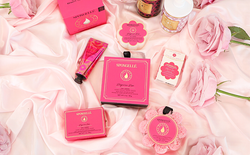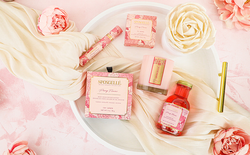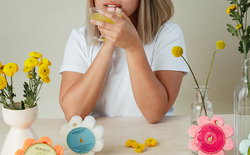Everyone wants glowing, clear skin, but achieving it can be a challenge. There are so many tips and tricks floating around, and deciding which ones to try and which ones to skip can feel overwhelming. Not all skincare advice is created equal, and sometimes it's totally false.
There are many skincare myths that you may believe and be incorporating into your routine. Let’s bust some of these skincare myths to discover the truth about how to care for your skin.
Myth #1. Oily Skin Types Should Skip Moisturizer
A common myth about skincare is that you shouldn’t use a moisturizer on oily skin. However, even oily skin needs hydration. You may have the urge to skip moisturizer if you have oily skin, but this can have reverse effects.
Sebum is the oil your body naturally makes to help your skin barrier lock in moisture. However, sometimes these sebum glands can go into overdrive when your skin becomes dehydrated. When you forego moisturizer, your body may react by overproducing sebum to hydrate your skin. Moisturizing your skin every day can help balance out oil production.
There are many causes of oily skin, but two of the most common are hormones and acne. Excess sebum can lead to clogged pores and breakouts. Using a moisturizer in your skincare routine can help keep your pores clean and breakout-free.
If you have oily skin, you don't need a super thick or heavy lotion. Choose a lightweight, oil-free formula that you can apply daily. After regular use, you'll notice less oily skin.
Myth #2. Hot Water Opens Your Pores
Most people love a hot, steamy shower, and many think it’s good for their skin. Unfortunately, hot water can strip your skin of its protective barrier and lead to dryness or irritation.
While steam does open up your pores, it doesn't have to be hot to work. Lukewarm water is an effective way to cleanse your pores while being gentle on the skin.
If you can't tell if your water is too hot, take a look at your skin. Redness after cleansing can indicate that your water is too hot. If your skin feels dry after you bathe, this may also be a sign that your water is too hot.
Make sure your skin is never dehydrated by applying a body lotion right after you shower. Try Spongellé's Honey Blossom body lotion. It provides the perfect combination of shea butter, jojoba oil, and vitamin E. Theseemollient ingredients will leave you with smooth, hydrated, healthy-looking skin.
Myth #3. You Sweat Out Toxins
You may think keeping your pores free and clear makes it easier for you to sweat out toxins. However, this idea is another common skincare myth. You can't sweat out toxic substances.
Your kidneys and liver are what filter out toxins in your body, while your sweat is made up of mostly water and minerals. The purpose of sweating is to cool off your body when it starts to overheat. It's your built-in air conditioner.
One study found that even when there are pollutants in sweat, the amount is minuscule. Don't sit in the sauna trying to eliminate toxins. Instead, drink water and let your body do its job.
Myth #4. The Highest SPF Is the Best
Another common skincare myth is that higher SPF sunscreens are better than low SPF sunscreens. However, using the highest possible SPF doesn't mean you are substantially more protected. There isn't much of a difference between SPF 50 and SPF 100.
The sun's damaging rays are known as ultraviolet rays, but there are different types of UV rays. UVB rays are what cause sunburn, while UVA rays penetrate more deeply into your skin. UVA rays can cause sun damage, resulting in fine lines and wrinkles. SPF only measures sunscreen's protection against UVB rays, not UVA rays. Both types of UV rays play a role in the development of skin cancer, which is why protecting your skin is so important.
Many assume that an SPF that's 50% higher means 50% more protection, but that's not the case. An SPF of 50 blocks 98% of UVB rays, while an SPF of 100 blocks 99%. Even SPF 30 blocks 96.7% of UVB rays. Therefore, you won't notice much of a difference using SPF 30 versus a higher SPF.
What’s the best way to protect your skin from the sun? Look for a broad-spectrum SPF that blocks UVB and UVA rays with a minimum of an SPF 30. Make sure you’re applying enough sunscreen to achieve the level of sun protection advertised, and reapply frequently.
Myth #5. Sunscreen Is Only Necessary When It’s Sunny
Another common myth is that you don't need sunscreen when it's not sunny. You may think a day without clear skies is the perfect time to go outside and get some vitamin D without the burn. However, if you ask a dermatologist, they'll tell you that you still need to wear SPF on a cloudy day.
UV rays can go right through those clouds, meaning you can still experience sun exposure. If you have sensitive skin, you could end up with a surprise sunburn or even dark spots (AKA hyperpigmentation). Even if your skin isn't sensitive, you should still apply sunscreen when you're outside, no matter what the weather.
Lather on that SPF and remember to reapply. If you're not baking in the sun, it can be harder to remember to reapply. You may want to set the alarm on your phone to remind you!
Myth #6. Drinking Water Replenishes Dry Skin
This myth may come as a shock. It's one that's repeated often, but drinking water doesn't actually replenish your dry skin. While drinking water does have many health benefits, it doesn't get absorbed by your skin.
The water you consume enters your bloodstream and is filtered through your kidneys. This process helps hydrate your body, but it doesn’t hydrate your skin. The best way to hydrate your skin is to avoid products that strip your skin, wear SPF, and use a daily moisturizer.
It can also help to use gentle soaps and cleansers and to look for lotions and creams with nourishing ingredients. Spongellé's body products can quench your parched skin. Wash your body with the White Ginger Hawaiian Buffer. It's made with Awapui and Kukui Nut Oil that will help soothe your skin.
After you bathe, finish with the French Lavender body lotion. The combo will help you achieve hydrated skin.
Myth #7. You Shouldn’t Exfoliate Sensitive Skin
Exfoliating your skin can help clear clogged pores and help prevent blemishes like blackheads. If you have sensitive skin, you may think that means you have to stay away from skin exfoliants. However, even people with sensitive skin can exfoliate.
You don't want to scrub your skin vigorously or use super harsh products, no matter your skin type. But using gentle exfoliators, like a Spongellé body buffer, can help clear away dead skin cells without being too abrasive.
When you get rid of dead skin, ingredients like vitamin C and hyaluronic acid will be able to penetrate your skin easier.
Myth #8. Acne Only Affects Teens
Dealing with acne-prone skin can feel frustrating and overwhelming. Many people first start experiencing acne when they go through puberty. Unfortunately, acne doesn't only affect teenagers. Plenty of adults also struggle with acne.
If you're fed up with waking up to a new pimple every day, it may be time to visit a dermatologist. They can recommend topical and oral acne treatments and tell you what active ingredients to add to your skincare routine.
Myth #9. A Burning Sensation Means It’s Working
Beauty is pain, right? This sentiment doesn't mean you should use a product at home that feels like it's burning your skin. If you apply a product and it causes a burning sensation or pain, take it off right away. If the burning doesn't subside a few minutes after removing the product, contact your dermatologist ASAP.
While there are products that contain natural ingredients that make your skin tingle and may even make it feel warm, they should never burn. You also don't want to leave a product on that gives you a stinging sensation. You may be allergic to one of the ingredients, and leaving it on could cause redness and puffiness.
If you have sensitive skin, consider doing a patch test on your arm to see how your skin reacts to a product before using it on your face. Another common cause of that burning sensation is using ingredients like retinol too close to your eye area.
Myth #10. Dark Circles Mean You're Tired
Your dark circles don't necessarily mean you aren't getting enough sleep. While a lack of sleep can make matters worse, it's not always the cause of discoloration. You can end up with dark under-eye circles if you have poor circulation or low oxygen or iron levels.
Dark circles also become much more noticeable when you have thinner skin. Your skin naturally gets thinner as you age, making it easier to see the blood vessels under your eyes. You can try using an eye cream that contains caffeine, which may help constrict blood vessels and boost circulation.
Summing It Up
Don't let these skincare myths steer you wrong. Not everything you hear (or read) is true. Consult a dermatologist to determine the best skincare products for your skin type. You can also incorporate Spongellé products into your routine for the healthiest-looking skin!
Sources:
Don't fall for these skin myths | Harvard Health
Analysis of sensitive skin barrier function: basic indicators and sebum composition | NCBI
Can POPs be substantially popped out through sweat? | Science Direct
What is the difference between UVA and UVB rays? | University of Iowa Hospitals & Clinics















